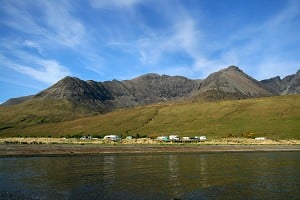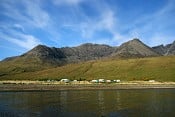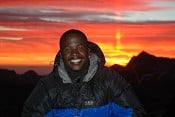
Hi
Does anyone have experience of using a hypoxic tent prior to a shortened expedition
I am basically asking does it work, does any effect stay until you get to a base camp
thanks
Just use a belt round the door handle and a lemon to bite on like the rest of us
I was just casually looking into these as I live and work far from mountains and musing on Dhaulagiri in a few years. Subscribed to the thread with interest.
I've not used one but have spoken to one of the guides from one of the main companies that was using them on Everest north side several years ago.
It seemed the best, maybe only, way to use them was to be really rigorous in your preparation - for the full amount of time, no missing days, no shortcuts, keep exercising etc. and do the fullest program they had, no half measures.
I stress this because I read that some of the clients had found it hard to stick to the regimen because of their busy, stressful lifestyles (the same types who want this shortened trip in the first place) and ended up either not doing it for the recommended time or missing days, or missing training, or sleep, while in it.
I remember thinking that this buildup used up so much time and weird effort if done 'right' that was it really more efficient than just going on the longer expedition? But clearly the answer for some people is yes, as they can still work during that time if they organise things right.
My main point with the guide I was discussing was whether other factors - sickness, travel delays, road/agent/porter delays and general logistical issues, as well as poor weather - may render this expensive inconvenient prep to be useless. But it seems not, as the best companies can prevent or manage some of those impediments (which they did seem to do) and the weather is always a gamble. But if you can do the tent regime, and pay for it, it stacks the odds significantly in your favour.
I know the French GMHM and others tried various programs back in the late 80s early 90s, with no success on Everest, but they were probably different systems (using a chamber etc) and took longer to get from home to ABC, thus losing some acclimatisation, and did not have the modern infrastructure of Sherpa-fixed ropes that speed things up so much once they did get to the mountain.
Thanks all especially Damo. It appears that with proper physical and mental training which I would do anyway prior to any trip, the use of hypoxic tents or similar do work. I am definitely in the busy and stressed category unfortunately……..and a shortened trip works for me. Guess thee are pros and cons like everything, pros being less time to catch a bug, less time away from home and work, and cons being less time actually in the mountains and local culture
> Thanks all especially Damo. It appears that with proper physical and mental training which I would do anyway prior to any trip, the use of hypoxic tents or similar do work.
There are plenty of anecdotes from those with a vested interest, but as far as I'm aware I don't think there are any actual studies? All of the docs that I know who are involved in the Mountain Medicine Diploma are very sceptical.
If you live in the European Alps or Colorado and can run up and down 4000ers immediately prior to travelling I'm sure that helps.
> There are plenty of anecdotes from those with a vested interest, but as far as I'm aware I don't think there are any actual studies? All of the docs that I know who are involved in the Mountain Medicine Diploma are very sceptical.
I was very sceptical too and was pretty dubious when talking to the guide about it. But my opinion was changed more by (briefly) looking at (some of) the results than his company's marketing.
I think the 'fast' performances would need to be parsed much more clearly and take other factors into account. The pre-acclimatisation might only help you move from KTM-BC-ABC-C1(?) faster than normal. But then with modern O2 (6-8l/m) and fully fixed route you can move much faster up the rest than before, so if you took away the higher O2 rate, maybe the bed-tent pre-acclimatisation might not seem so successful. In some ways the 'normal' expedition members are a control group against which to compare the bed-tent people, but there are probably too many other variables for a true in/validation.
Thanks all
I just need to try and speak with someone who has used this method and also been at altitude without as a comparison
i am sceptical that you can go from home in uk and summit to nearly 7k meters (ADablam) and back home in two weeks
Tom due to no 4000m peaks where I live, I will continue to use the tried and tested method of laps on Kinder 😁
Cheers
havent read all the replies, so apologies if i am repeating what anyone else has said, but a guide i have climbed with a few times mentioned that a few of his clients had used these (or perhaps had time in a chamber) and he didnt think there was any appreciable affect. i believe they were just doing euro alps stuff.
I was looking into these too.
I live at sea level and there are no high enough peaks in which to train (also there appears to be no "altitude training" facilities near where I live). So the only thing I can really do is sea level cardio fitness.
I did see a guy on youtube reviewing one of these things and he mentioned it was quite noisy. As a light sleeper I am not sure if I could handle that.
> i am sceptical that you can go from home in uk and summit to nearly 7k meters (ADablam) and back home in two weeks
Oh, you can definitely do that. It's not the way I do/done things but plenty of people have done similar for Aconcagua, Huascaran etc.
With AmaD you have the advantage that if you pay enough, and are pre-acclimatised, you can helicopter in/out from KTM, thus removing a week or so from a normal itinerary.
I would think that for Euroalps stuff that they could have a real impact. You can do as much cardio as you want, but unless you're going to use EPO you're not going to get the extra plates that weeks of being at high altitude will give you, and you get all the advantages of training low and sleeping high.
Expensive and noisy apparently tho'
There is no evidence base that suggests hypoxic tents are effective. Folk who have mentioned chambers could potentially be describing hypobaric chambers, i.e. different to normobaric use of tents.
Its fairly fundamental I'd say... reduction of the partial pressure of oxygen, whether through reduction of total pressure or by percentage of gas in the mixture, is effectively the same as far as the body us concerned. If one can simulate altitude for 8 hours a day using one of the tents, it will very well replicate going to altitude. But 8 hours in a tent won't be the same as 24 hours at the equivalent altitude of course, by a simple matter of duration.
This is not kooky science or healing stones, its well used in some sports as a method for either altitude preparation (e.g. playing football in La Paz) or performance enhancement.
Whether it is worth the cost/faff is another matter though. And then there is how well the tent or head covering is sealed to create the low oxygen atmosphere. All issues that need to be addressed. However, if, like me, you live in the Netherlands and work in Qatar (both at sea-level), then they do pose as an option for helpful preparation in going to altitude and increasing the chance of aclimasation.
> There is no evidence base that suggests hypoxic tents are effective. Folk who have mentioned chambers could potentially be describing hypobaric chambers, i.e. different to normobaric use of tents.
I was specifically referring to tents.
That study is over seven years old, the use I am referring to has been after those studies were done, ie. the few years pre-Covid.
It only looked at 13 studies and concluded...
"However, the presence of confounding factors such as time spent in hypoxia, temperature, and humidity, and the limited statistical power due to small sample sizes, limit the conclusions that can be drawn from these findings."
quite possibly. I have no experience so can't really comment, I'm just passing on some second hand information (although this guy does know what he's talking about).
one issue could be that the hypoxic tent doesn't actually reduce the air pressure, just the oxygen content *shrugs*
> one issue could be that the hypoxic tent doesn't actually reduce the air pressure, just the oxygen content *shrugs*
The traditional way of doing this used to be to zip your tent up tight with the primus left burning.
> one issue could be that the hypoxic tent doesn't actually reduce the air pressure, just the oxygen content *shrugs*
See my post above. Its only the partial pressure of oxygen that matters. Either methods has the same result.
Same applies in reverse with diving... can either go deeper for a given gas mix to reach oxygen toxicity levels or have a higher oxygen content at same depth. For the body its the same.
> Its fairly fundamental I'd say... reduction of the partial pressure of oxygen, whether through reduction of total pressure or by percentage of gas in the mixture, is effectively the same as far as the body us concerned.
How can you be certain of this?
I would appear there are mixed results from studies about whether just reducing oxygen partial pressure is as effective for acclimatising when compare to training at high altitude.
https://outdoors.stackexchange.com/questions/19532/is-altitude-tent-helpful...
It certainly wouldn't surprise me if there are some changes that your body needs to go through simply due to the changes in air pressure irrespective of any any changes to the partial pressure of oxygen.
Or the ultimate spanner in the works, it matters for some people and not others.
Given that at roughly atmospheric pressures from sea-level upwards (I.e. not scuba diving) the partial pressure of nitrogen is largely inconsequential for the human body, the only other thing left is the partial pressure of O2. All other components of air are in too small a percentage to have much effect. So, as with diving, the body only 'sees' the partial pressure of O2, regardless of the total pressure (as far as respiration goes).
The two changes the body experiences as a result really stem from the same thing and one is a consequence of the other. Firstly the lack of oxygen causes a response to increase the red blood cell count. Secondly, the additional breathing required to maintain blood oxygen (before the red blood cell count can increase sufficiently) causes a reduction in blood CO2 (more exhaled). This reduces the acidity of the blood (dissolved CO2 is acidic), causing the body to offload bicarbonates (alkaline) via the kidneys to compensate.
It's largely the offloading of bicarbonates that causes many of the problems with altitude sickness. It's more complex than this of course, but it's one of the key things. So, if one can already reduce the partial pressure of O2, causing a red blood cell count increase response, then the body doesn't need to breath as heavily which results in less reduction of blood CO2. Acclimatisation is effectively the sum of increasing (or rather regaining) blood oxygen capacity and also reduction of the negative symptoms of altitude sickness.
A hypoxic tent may not 100% replicate the effects of altitude due to the complexities of the human body processes (and that there could be other processes that need to happen as a result of the change in pressure which I'm not aware of, as you mention) but it certainly does work as a technique, all other things being equal.
Check out the work of this Doctor.
Andrew Cumpstey
University of Southampton · Academic Unit of Clinical and Experimental Sciences
BMBCh MA MRCP FRCA DiMM
He's recently gained his PhD, and qualified as a MCI, worked as team doctor on the recent Honnold/Findlay Greenland expedition and has been on several high altitude expeditions doing research on anoxia.
Hi yes I have experience from last spring - I climbed 2 8,000m peaks in a 4 week trip (using supplementary oxygen), following six weeks of using a hypoxicator. I’m a doctor with an interest in altitude medicine and have a reasonable amount of previous experience at altitude to be able to compare to. I found it made a huge difference. Happy to discuss further by private message if you want to contact me. Good luck.
> Just use a belt round the door handle and a lemon to bite on like the rest of us
You win the internet for that one!
As an alternative I was on a snowy hillside below a casualty in a bivvy bag with another rescuer above the casualty. It was windy with sub-zero temperatures. After a while I realised I was hyperventilating. It eventually struck me that we were rather airtight and all the carbon dioxide was sinking down to my level - once I realised got some air in and all well. Odd phenomenon to experience at the time.
In the recent cold snap I found a fast way to warm myself up, basically putting a blanket over my head. It's weird how when the CO2 builds up you don't have trouble physically breathing but your brain is going "LOW OXYGEN".
So don't rent a hypoxic tent, just sleep with your head under the covers.
The concentration of CO2 in the blood is what causes the urge to breath. It's why hyperventilating before free-diving is so risky... you lower the CO2 in your body by rapid breathing and then ultimately you pass out from lack of O2 before you get a strong urge to breath.








